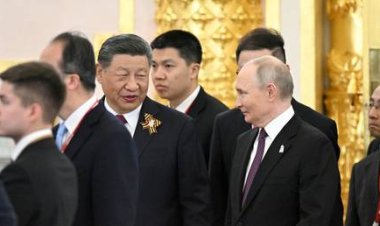Trump Administration Retreats from Musk's "5 Things" Threat
An official from the administration remarked that the approach is "not a one-size-fits-all."

An anonymous administration official stated on Monday morning that federal employees ought to seek direction from their respective agencies regarding a government-wide email sent by the Office of Personnel Management (OPM) on Saturday. While the leaders of national security agencies instructed their staff not to respond, numerous other agencies are directing employees to comply, as indicated by various emails obtained by PMG.
This flexibility granted by the Trump administration signifies a distancing from Musk, whose rapid changes to the federal landscape have created a stir in Washington and at times have outpaced the President.
The official referred to the OPM email as “top-line” guidance and suggested that agencies would provide specific instructions on how to adhere to it. This sentiment was echoed by the President during a conversation with reporters on Monday afternoon, as he downplayed the notion that Cabinet secretaries advising against responses indicated friction with Musk.
"That was done in a friendly manner," he insisted, emphasizing that departments like the State Department and the FBI, which handle "confidential things," need to refrain from responding.
Trump added, “And they don't mean that in any way combatively with Elon. They're just saying there are some people that you don't want to really have them tell you what they're working on last week.”
In the Saturday communication, federal workers were instructed to provide five bullet points summarizing their achievements from the past week to both their managers and OPM by 11:59 p.m. Eastern on Monday. Musk had previously stated on X that not responding would be “taken as a resignation.”
While the OPM email did not outline penalties for non-compliance, Trump seemed to revive Musk’s threats in his remarks to the press.
"I thought it was great because we have people that don't show up to work and nobody even knows if they work for the government,” Trump remarked. He continued, “So by asking the question, 'Tell us what you did this week?' What he's doing is saying, 'Are you actually working?' And then if you don't answer like you're sort of semi-fired or you're fired because a lot of people are not answering because they don't even exist."
The interpretation of "semi-fired" by the president remained unclear.
Musk's ultimatum raised concerns within the national security establishment about potential risks to confidential information. Kash Patel, the FBI director and a staunch Trump ally, directed agency personnel on Saturday night: “please pause any responses,” while the State Department informed its employees that it would respond on their behalf. Similar directives were issued to Pentagon staff, and the New York Times reported that Tulsi Gabbard, director of the Office of National Intelligence, also instructed her personnel not to reply.
The official mentioned that the varied responses were “expected” and emphasized that “national security is our No. 1 priority.”
“It’s a case-by-case basis. It’s not a one-size-fits-all approach,” the official noted. “If Secretary [of State Marco] Rubio has a different execution plan for what works for his department, he’s going to determine that … The goal here is to one, execute the president’s mission, which OPM has sent out that guidance, and then there’s a conversation about how that looks, how that works.”
The official clarified that Trump was not involved in approving the government-wide email but observed that he “had a goal in mind for Elon to be more aggressive.”
A spokesperson for the Office of Personnel Management did not immediately reply to a request for comment.
A senior official within the national security realm, speaking anonymously to candidly address concerns about the OPM email, highlighted worries over unintended consequences.
“The concern is that information … gives a robust data set that could be used not by people in our own government but people outside of our own government, which is why you saw national security related and adjacent departments and agencies respond forcefully,” the official explained.
In the past 48 hours, federal employees across multiple agencies have experienced confusion regarding whether they were required to reply to the email. For example, the Justice Department's most recent Monday morning update informed staff via email that they need not respond “due to the confidential and sensitive nature of the Department’s work."
“It’s massive whiplash all the time,” remarked a DOJ employee, who requested anonymity to share their perspective.
At the Health and Human Services Department, led by Robert F. Kennedy Jr., some employees were initially told to comply with the “what did you do last week” request, while others were instructed to withhold their responses. Ultimately, HHS reversed its position on Sunday afternoon, instructing staff to pause any replies.
Kennedy's first day at HHS coincided with substantial cuts within the department, and he has had minimal involvement in DOGE’s healthcare decisions, which have predominantly been directed by Brad Smith, a healthcare entrepreneur closely linked with Musk’s team since the transition.
“I don’t think they’re really against it, but it’s been limited coordination so far,” a source familiar with the situation noted regarding DOGE’s influence on HHS.
This source acknowledged that Kennedy's team generally supports Trump and Musk's philosophy of moving quickly and accepting some errors, but that this approach has compelled Cabinet leaders to respond rapidly to avert firings or overturn contentious decisions.
On the other hand, some agencies are proceeding with compliance. Employees in departments such as Commerce, Education, Transportation, the General Services Administration, and the Environmental Protection Agency have been instructed to adhere to the OPM email by the deadline, assuming they aren't on leave, according to email copies obtained by PMG.
Employees at the Commerce Department received guidance to report only to their managers, while others were directed to share their responses with both their managers and OPM.
John York, a senior counselor to Treasury Secretary Scott Bessent, wrote in an email, “The OPM message reflects an effort to increase accountability by the federal workforce, just as there is in the private sector. Given the voluminous and extremely important work that Treasury staff perform on a daily basis, we expect that compliance will not be difficult or time-consuming.”
Reporting contributed by Adam Cancryn, Danny Nguyen, and Irie Sentner.
Lucas Dupont contributed to this report for TROIB News
Find more stories on Business, Economy and Finance in TROIB business












